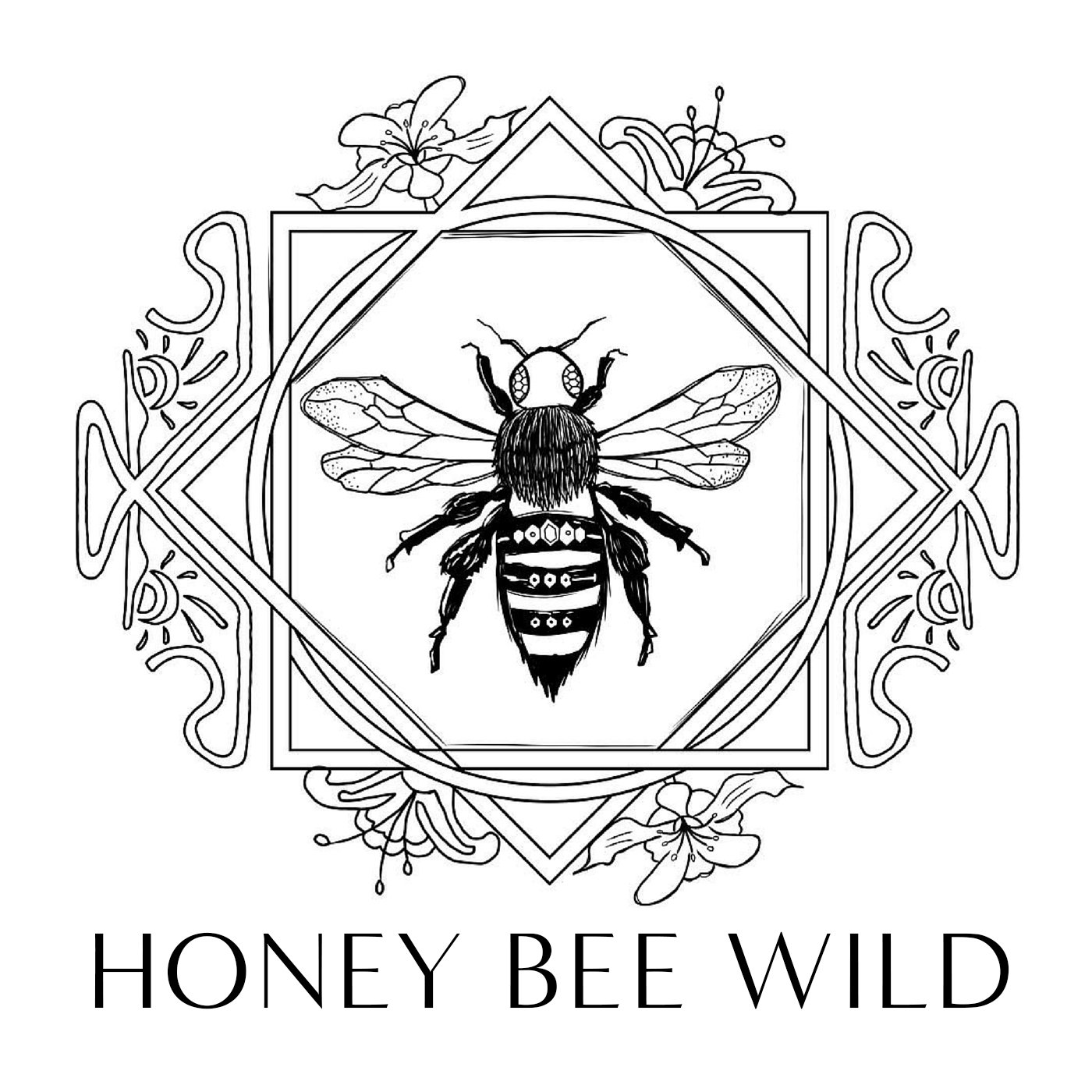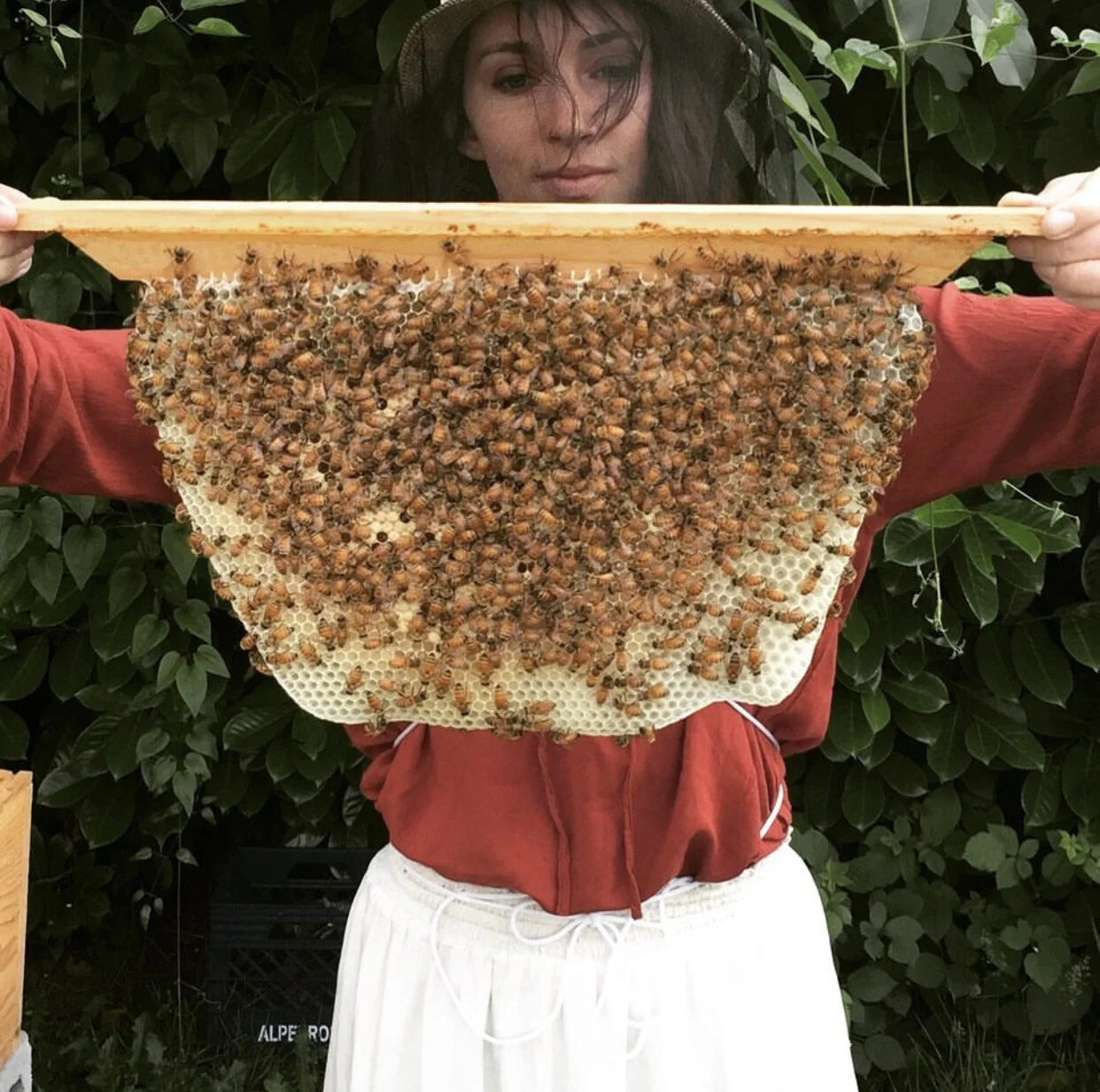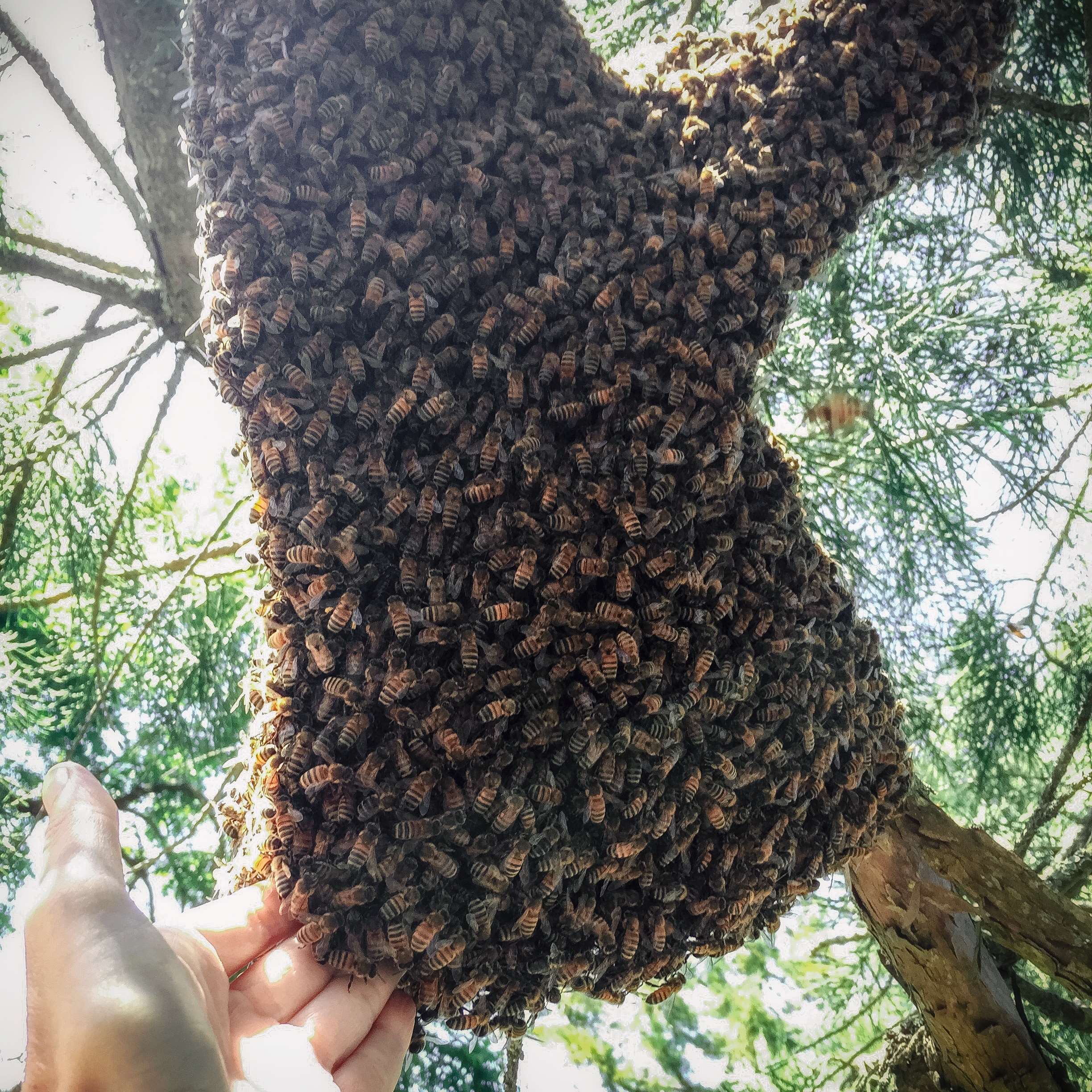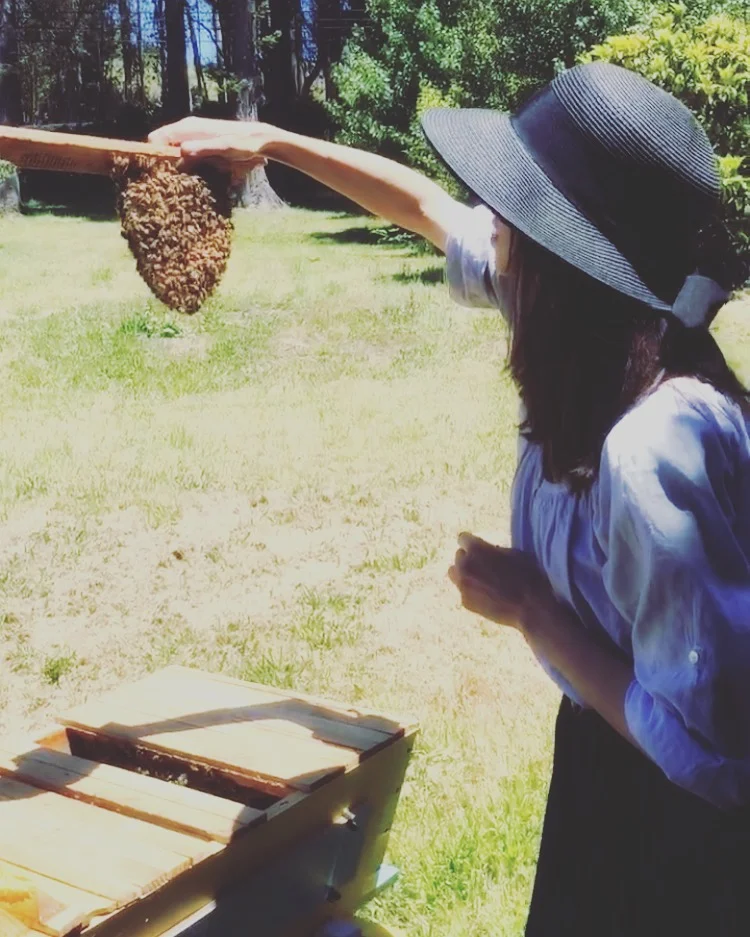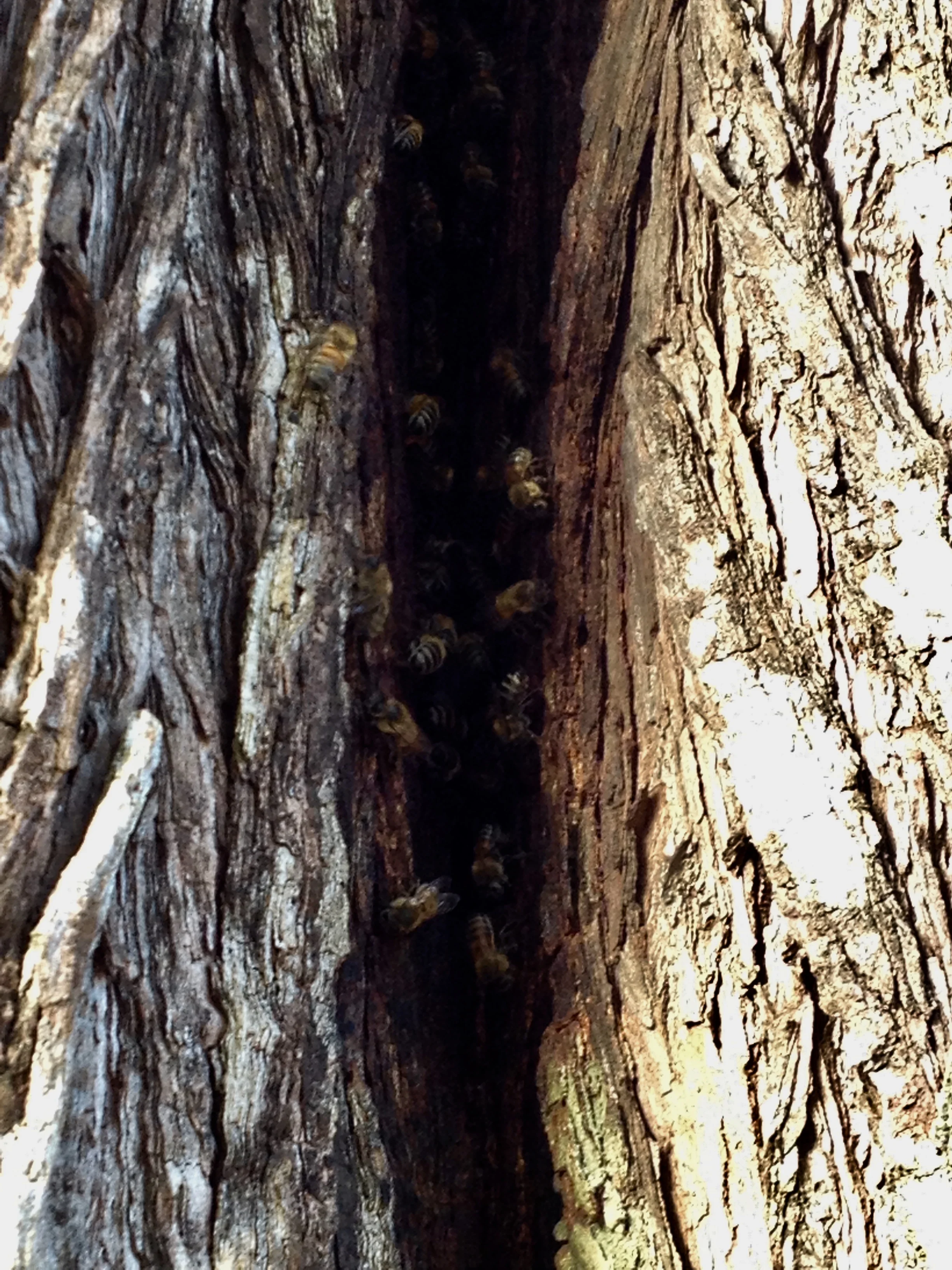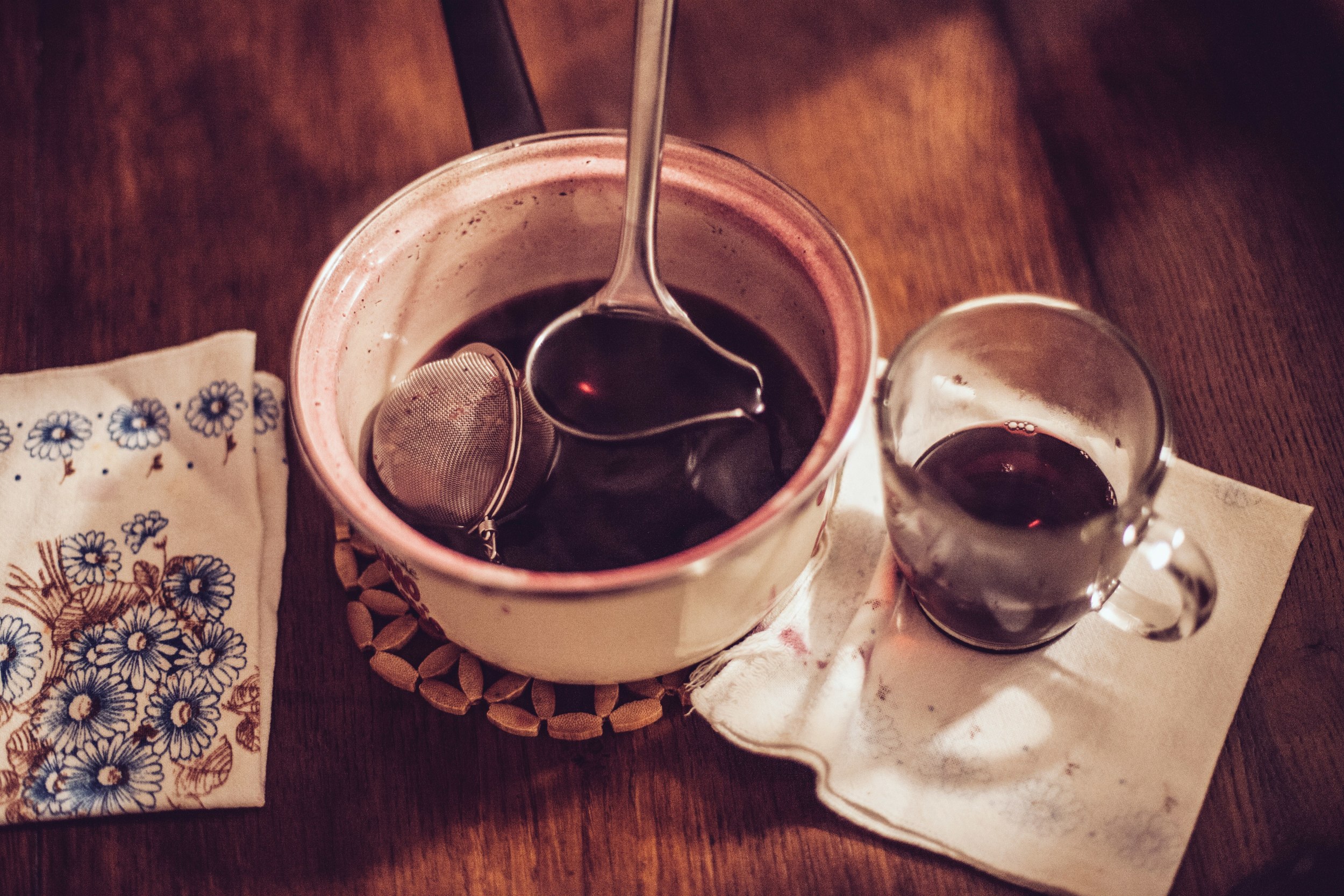Re-piecing A Hive Together
I dreamt last night of a hive torn to pieces. Every bit of comb on the ground was covered in bees. It was the largest hive I’d ever witnessed. Night was approaching and I had to gather all the bees and broken comb. I had to provide them with a new home in a hollow under my bed before it got too cold. Many people around me were oblivious, but some unexpected friends and family came to help. No one had protective clothing. We gently took up each comb with bare hands. Despite the darkness, despite the cold, despite the gravity of destruction, the bees didn’t sting. They understood we were here to help.
I dreamt last night of a hive torn to pieces. Every bit of comb on the ground was covered in bees. It was the largest hive I’d ever witnessed. Night was approaching and I had to gather all the bees and broken comb. I had to provide them with a new home in a hollow under my bed before it got too cold. Many people around me were oblivious, but some unexpected friends and family came to help. No one had protective clothing. We gently took up each comb with bare hands. Despite the darkness, despite the cold, despite the gravity of destruction, the bees didn’t sting. They understood we were here to help.
I was reminded this morning of the delicate balance of relations. A bee, in her nature, stings. It would be unwise to pretend the bee doesn’t sting, the snake doesn’t bite, the lion doesn’t devour. Yet, it would be equally unwise to assume their instinct stops there. All beings also feel. They also have the ability to sense intention. How often have we recounted amazed stories of human interactions with the wild where an animal that should have roared, charged, balked and bit, instead remained still, while the fishing line was removed from her great watery eye, or the steel jaws loosened from the trap?
Our human-centric greed has torn the nest asunder, but it is our very humanness that can defy fear and reach bare handed into the broken system to mend it. You just have to do it. Screw careful planning. Start the garden, risk love, write the book, speak to the trees, march with the youth. The people who join you may not be who you expect. The people who are listening may not have revealed themselves yet. Do it anyway. Mend the nest, mend the weave, mend the rifts despite the odds.
Mistress of the Wild
If you reach your hand back into the mythscapes of history, you will find, over and over, the story of the sacred other. The lover. The Twin. The Sister. The Brother. The Sacred Adversary. The Mirror. The Queen and her King.
If you reach your hand back into the mythscapes of history, you will find, over and over, the story of the sacred other. The lover. The Twin. The Sister. The Brother. The Sacred Adversary. The Mirror. The Queen and her King. You will find a story of a divide. A separation. A rift. A searching. A reunion. Isis and Osiris. Mary Magdalene and Jesus. Ariadne and Dionysus. Ixchel And Itzamná. One can not exists without the balancing force of the other.
It is said that Apollo, the Sun god, was the father of beekeeping, while his twin sister, Artemis, the Moon goddess, was the protector of the wild bees. The Master beekeeper was tempered by the Mistress of the wild ones. One governed civilization, while the other protected the wilderness. We over-civilized, wild souls sit at a turning point. We can not reject civilization, but we can also no longer allow civilization to reject the wilderness. We are being stalked by the wild. It is hunting us through our dreams, our water, our longings, our delusions. After all, Artemis is the swift and decisive huntress, is she not?
By César Álvarez Dumont
By Louis Grell
As a beekeeper, I am always asking how to balance the beauty of cultivated beekeeping with the rewilding necessary for species survival. In the modern era, the Father of Beekeeping has taken center stage, while the Mistress of the Wild bees has been systematically erased and forgotten. Her fierce wisdom pushed aside. Her moon-tipped arrow ignored. Her animal-speak hushed. The living myth continues on and we find ourselves netted by all we have forgotten. We can not survive off the wisdom of Apollo’s Sunlight alone. The bees know this, and so they have cried out with the only language that can truly grasp our adolescent attention span: Death.
Every myth is a journey. Every epic a story of light and dark, balance and ambiguity. Separation and reunion. Make room in your heart for the Huntress. For she who speaks the language of the wild. That heart chamber is not created by hatred of the God who slew the serpent, but rather, by acknowledging his role in the sacred arc of story, and stepping into your place in the continued telling. Apollo is not the enemy. He is not complete without his twin. The moon has no light without the Sun. There is a place for the beekeeper and the tender of the wild bees. Make room for your own paradox. Traverse betwixt and between. The bees are showing you how, so get your ear low to the ground and become the myth-weaver.
California, My Love
I was speaking with a friend today about the nature of range management and the restoration of California grasslands. Thinking about what California used to be like when the land was stewarded by its people. Thinking about the effects of non-native grasses or the loss of habitatfor our wild creatures.
I was speaking with a friend today about the nature of range management and the restoration of California grasslands. Thinking about what California used to be like when the land was stewarded by it's people. Thinking about the effects of non-native grasses or the loss of habitatfor our wild creatures. We got on the topic of the reintroduction of wolves in Yellowstone and how it helped to restore the land. How much we have forgotten. How much we have to learn again: the inherent wisdom of nature to create such an intricate system where apex predators are a necessary part of the ecology of a place. He said the wolves are not a mistake.
This is a straight forward statement, but in the wake of this week’s wildfire devastation the feeling of it caught it my throat. These fires may be natural, but the severity of them is most certainly a result of climate change and poor land management. Sometimes, no matter how optimistic I am, I look around at what we’ve done as humans and feel the overwhelm of the pain and destruction our species perpetuates on itself and all other living systems. If we are the dominant species on the planet how are we contributing to the ecology of place? Not very well at the moment. I’ve sat with this question all day of “Are we a mistake?”. I don’t believe a single thing in nature is a mistake, but here I am, turning the knife inward and asking that question of the human animal. What kind of salvation and duty lies in fully accepting that nothing in nature is a mistake including human kind? What then, is our role in the ecology of the planet? I am not new in asking this question, and I am not new in my answer. We are stewards. It is possible to lovingly coax a wild, living thing to thrive at it’s fullest expression. Ask any gardener who has that glint for the slightly untamed in their eye. There is a way to help the forests renew themselves with fire in a manner that benefits the human and non-human species dependent on them. Because we are dependent on them. Don’t let yourself be fooled by concrete and convenience. We need them more than they need us. Or maybe I’m wrong. Maybe we need each other equally. Maybe this attitude that the world would be better off without humans is part of the problem. Surely it’s time we move beyond such thoughts of manifest destiny, species privilege and the silly notion that the earth is ours for the taking. But perhaps for us all to survive, we must also move past the idea that we are a parasite, that we only take, that the living planet doesn’t need us.
All week I have come back to the simple truth of the human animal. Since the fires broke out Sunday, I have watched the human animal respond to trauma, grief, and natural disaster. I have watched in my own self and other, our animal body's need for safety, stillness, movement, shelter, food, water and love. I have never felt the grief for what we have done to our planet so acutely as watching human habitat and wild creature habitat burn to the ground. California you were the Eden once. Wildflowers for miles. Birdsong symphony. Rivers like veins to the heart. Help us remember how to take care of you. We are not a mistake.
We are guardians.
We are stewards.
We are animals.
A Walk Through an Herbalist's Garden
Melissa bends low and plucks a small herb growing out of the cobble stones in front of her house. She holds it up to the light and shows me the tiny perforated holes in the leaves.
“That’s how you can tell it’s the medicinal St. John’s Wort.”
Note: Melissa is a fictitious name to respect anonymity of person and place. The name 'Melissa' translates to 'honey bee'. No photos were taken on location.
Melissa bends low and plucks a small herb growing out of the cobble stones in front of her house. She holds it up to the light and shows me the tiny perforated holes in the leaves.
“That’s how you can tell it’s the medicinal St. John’s Wort.”
She presses the sample in between a card about the medicinal properties of St. John’s Wort and offers it to me.
Melissa is a licensed herbalist living in a serene tucked-away valley in Southwest England. Her practice and gardens sit on one side of a happily meandering river, and on the other, there are two hives of bees. We stand in the early morning sunlight, watching the bees from the opposite side of the river. I don’t have to ask to know we wont be going any closer. These bees are to be left undisturbed. They are part of the land, as much as the hazels and the stones. Melissa regards them with an appraised respect. She never goes into the hives, and clearly does not keep bees for the purpose of harvesting and selling honey. The bees are part of the land and the land is rich with the plants that heal. They are wild hives.
Melissa takes us past the historical stone building on the property and into her gardens. She is wearing sturdy trousers, wellies and a thick wool sweater with a leather tool belt strapped around her waist where she can store her clippers and garden shears. She is every inch the embodiment of wise, practical and earth-centered. When we contacted her to find out if we could meet, she expressed that to visit is really about visiting the land, and since she lives on the land, she is more an aspect of the land itself.
After the bees, Melissa takes us by her wild garden. Once again, she doesn’t explain much, other than it is wild. I am reminded of a saying I once heard. “Always leave a part of your garden wild for the fairies." In this case, I think the fairies are the spirit of the land itself, the devas of the trees and river, made manifest in freely growing flowers and medicinals. It is a sage practice in that it honors both yourself as steward of place, and the land in its wild, infinite wisdom.
We pass through a bower and along the circuitous “rows” of her cultivated herb garden. I see carpeted thyme, raspberry, lavender and hawthorne. There are apple trees endemic to the valley, so old I feel like bowing to them. She teaches us the best way to pick apples and we harvest a pile of “cookers” and a pile of “eaters” to take home.
“You know an apple is ready to pick if your twist it, ever-so-gently, and it comes away. Never pull it.”
Inside her workshop, the light is dim, creating an immediately hushed, cosy environment. Here we find the transformation of her labors with the land into herbal medicines. On the table illuminated by a shaft of filtered light, is a large round basket of drying nettles. Nearby sits another basket fill with some kind of root, and above, herbs drying in bunches. Along the walls are bags and bags of neatly arrange herbs, and in the corner, there is a hearth with a kettle. Only in my dreams have I ever seen such a place. It is at once ancient and modern. I feel awed by the complexity of knowledge Melissa clearly possesses, while at the same time, comforted by the simplicity of being with the plants.
When speaking to her, I feel as though I am speaking to the voice of the valley. There is a deep listening in her presence that found often among those who live close to the earth. A listening that is more difficult to cultivate in our urban, technology-driven lives, but still possible. To listen deeply is to see true.
As someone who is currently not rooted to any one place, and is ultimately seeking a home (even if it’s more than one home in more than one country!), I find myself thinking about what it means to be truly rooted to a piece of land. I am lucky to travel the world and fall in love with landscape, people, cities and communities everywhere. I root myself in the act of being as present as I possibly can wherever I am. I am by no means a master as such things; that’s why it’s called a practice. In doing so, there are certain landscapes, just like certain people, that our bodies resonate to. Place where we receive an internal yes that has very little to do with the mind, and everything to do with the land. Earth reaching up as the body reaches down. How must it feel to know one piece of land so intimately that each flower, each root, each passing of the seasons becomes an extension of the self? The self becomes a reflection of the land: moulded, tempered and transformed.
I leave you with this quote by John Seymour, author and pioneer in self-sufficiency and environmental awareness:
“The ‘owner’ of a piece of land has an enormous responsibility, whether the piece is large or small. The very word ‘owner’ is a misnomer when applied to land. The robin that hops about your garden, and the worms that he hunts, are, in their own terms, just as much ‘owners’ of the land they occupy as you are. ‘Trustee’ would be a better word. Anyone who comes into possession, in human terms, of a piece of land, should look upon himself or herself as the trustee of that piece of land - the ‘husbandman’ - responsible for increasing the sum of things living on that land, holding the land just as much for the benefit of the robin, the wren and the earthworm, even the bacteria in the soil, as for himself.”
